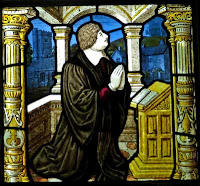In
high school, I read a collection of stories called Rod Serling’s Triple W: Witches,
Warlocks, and Werewolves. One story in particular fascinated me. Written by
Joe E. Hensley, it was titled “Not Quite Human.” I never forgot the story, but
I forgot the title, the name of the author, and the book in which I was
published. It was forty years later (literally) that, with the help of the
internet, I found it and got to read it again. It still impressed me after all
that time.
The
story begins with the destruction of the earth. An alien race has destroyed Earth’s
civilization and is about to report back that a new world is available for
colonization. And something else will please the authorities on their home
word: miraculously, forty of the planet’s
inhabitants somehow survived the attack. They are imprisoned on the ship and
are being taken back for study.
Soon,
however, strange things begin to happen. A crewman commits suicide. You learn
that the alien world is a repressive world. Anyone who makes a mistake is “exterminated.”
The Captain of the ship will probably die due to what happened under his
command. Soon others follow. The crew seems to be going mad. Everyone but the Captain
is soon dead. The leader of the earth inhabitants that did not die tells the captain that this is because they are vampires. They were buried for centuries in the earth with stakes through their
heart. “Your fire burned away the stakes,” he said, and they have revived. The
story ends like this. But there is at least a hint that the vampires will force
the captain to fly the ship home so they will have a new race of beings that
can be their prey.
This
was the inspiration for a story I published called “Soil Samples.” Earth is not
destroyed in my story. The aliens come as scouts. They land on earth,
survey it, capture some its animals and collect samples of its plant life. They also
bring soil samples in large boxes. During the course of the voyage, a wild
boar gets loose and attacks one of the aliens. Bleeding badly, he climbs up on
one of the boxes of dirt from Earth and dies of his wounds. Unfortunately
for the crew of the ship, the blood revives remains embedded in the soil samples.
The
Vampires—Rebecca, Hugh, Ethan, Mia, and Felicity—come from various eras. Like
the creatures in “Not Quiet Human,” they have been revived—not by fire burning
away the stakes in their heart, but by blood soaking down into the soil where
they were buried.
Rebecca
transforms to a bat and flies about the ship. She hears someone speaking
English, takes on her human-like form, and captures an alien woman, Devva. She tells
Rebecca she has been inducted into the military to learn the English language. Rebecca
tells her they need her help. She dresses in one of Devva’s extra uniforms and the
two of them head back to the where other vampires are waiting. Devva decides to
warn the crew when three of her fellow aliens appear. Rebecca makes short work
of them and threatens to kill her if she betrays her again. Devva has noted
that the earth beings are not harmed by the weapons of her people.
She
tells the group of vampires that the ship is monitored but puzzles that no one
has seen them. Mia, a vampire who lived into the second millennia, suggests
that just as they do not make reflections they also may not show up on camera.
The vampires, aided by Devva, manage to take control of the ship. They learn of
a rebellion going on. A prisoner on the ship is involved with the rebellion and
will help them connect with rebel factions.
 |
| Rebecca |
Rebecca
feels badly that she has been so brutal with Devva and wonders why this human woman cooperated so much. Devva tells her that her sister got involved with the
rebellion, was captured, tortured, and killed by the government. She has a
family but despairs of ever seeing them again, knowing that because her sister
was a rebel she will eventually be killed as well. Rebecca remembers how her
crossing over into the world of vampires separated her from her husband and
family.
In
the last scene, the ship is going to join other rebel ships. Their destination
is the alien home planet—a new world on which the vampires can settle and find
blood.
“Soil
Samples” appeared in Bloodbond,
published by Alban Lake. Get a copy here.
For additional titles, check out my Amazon Page. Here is a link.
I would love to hear your comments.





